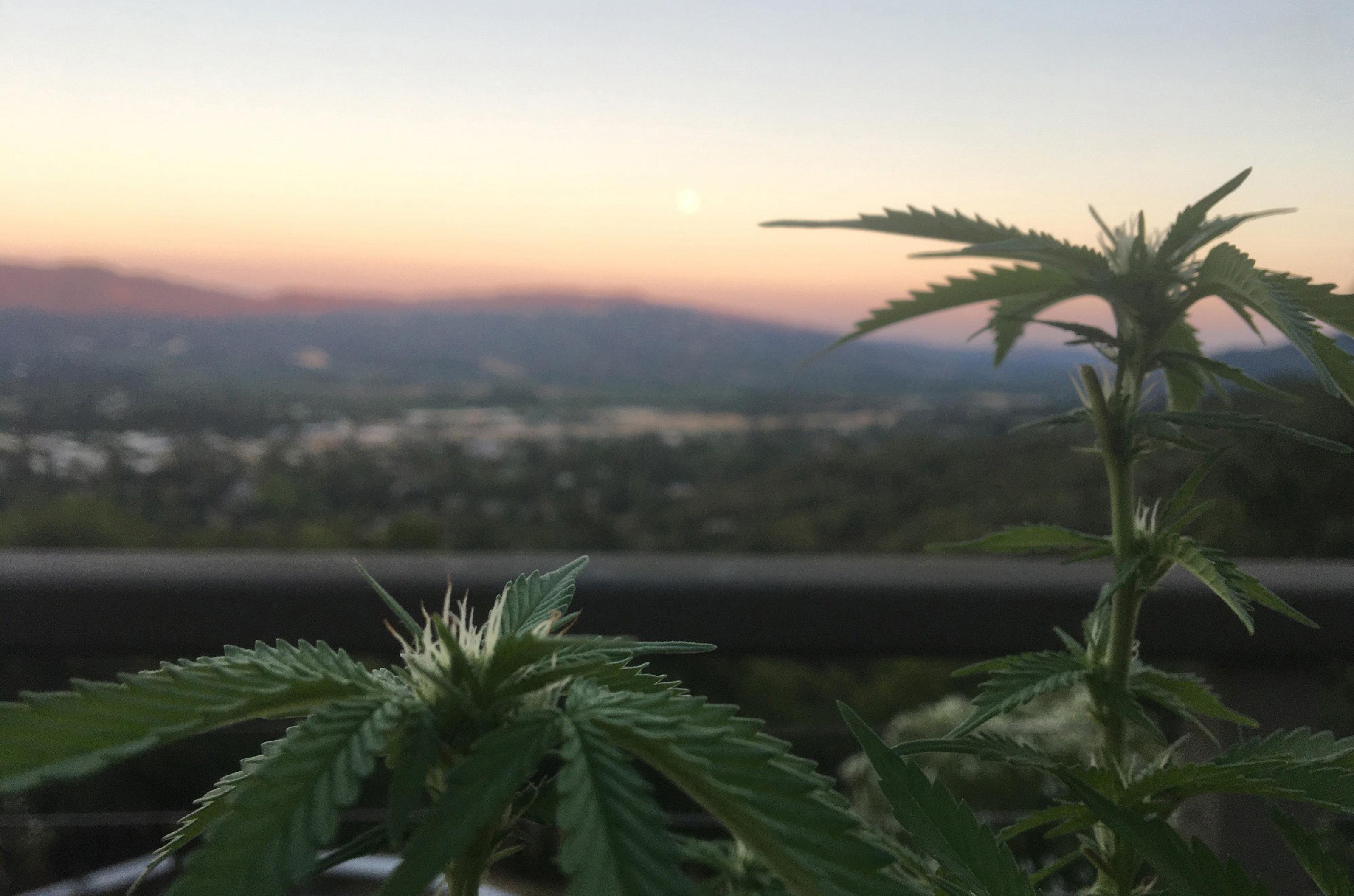
30 minute read
THE LIFE
The People (and Plants) Have the Power
Amanda Reiman inspires and empowers others to curate their own sacred plant relationships. TEXT JEN BERNSTEIN
Advertisement
Cannabis has always been Amanda Reiman’s ride or die. When she’s waxing poetic about cannabis, you get the sense that Reiman’s life has manifested their very symbiotic relationship. “From the minute I ingested cannabis, it felt like coming home,” describes Reiman. “All of us have certain plants that we have good relationships with, kind of like a veggie that always sits well and makes you feel good,” she says. “I can’t claim to know why, but for me it’s always been cannabis.”
Backed by twenty years of studying the relationship between humans and plants, Reiman also holds a PhD from UC Berkeley, and has had an inspiring career working with Berkeley Patients Group and the Drug Policy Alliance.
From helping with the decriminalization of psychedelic drugs (Senate Bill 519) to her newly appointed position as Chief Knowledge Offi cer with New Frontier Data, Reiman describes herself as a translator between science and media. She’s fi nding ways to make data accessible and understood by everyone. Reiman is helping to create sound policy and research that’s not based on propaganda or fear. As a 24/7 activist, drug policy expert, and scientist, Reiman relies on her “Spidey Sense”— meaning, she’s always looking at ways the media is portraying our relationship with plants, investigating what the research is actually saying, and
then is translating this important information to help avoid the public being misinformed or misled. In her new role at New Frontier Data she’ll be leading the research team, looking forward to helping businesses succeed, and getting a better understanding of how the industry can be successful.
As the founder of Personal Plants—a multimedia platform that encourages and supports home cultivation of entheogenic plants—Reiman is again proving the power of cultivating our relationship with the plant queendom. Knowing that our journey with plants can be just as unique as hers, Personal Plants goes beyond cannabis to explore the whole sacred garden, empowering us to become our own researchers, scientists, and enlightened wanderers of the plant world— by crafting and curating our own new friendships. Reiman took the time to speak with Sensi about being a plant person.
What if the plants have been cultivating us? Plants have successfully gotten humans to cultivate, protect and distribute them around the world.
Knowing is always important and very often frightening. Our brains like to keep us in the dark when the truth is scary or overwhelming, but ignorance is worse.
Social Justice is the number one reason to legalize cannabis. Capitalism demands regulation, taxes and licensure, but legalization isn’t about that. It’s about reducing the likelihood of criminal justice involvement and the collateral sanctions associated with said involvement, full stop.
I love to just dance, especially to 80’s music. Movement is freeing and music is healing.
Creativity shows up
when you stop thinking. Loosen the grip on your mind and new connections will form. I always get my best ideas when I am engaged in strenuous exercise because my brain can’t concentrate on any one thing except what my body is doing.
I entered the drug policy reform space to change how we view and treat substances and those who use them. It’s more than just changing laws, it’s about changing long standing, entrenched paradigms about intoxication, euphoria and fear of the “other”.
Music can provide a healthy escape. It’s a mood elevator, sensory experience and can invoke warm feelings of nostalgia, so turn it up!
Your mind will always
take the easy route, don’t let it. Be mindful of your mind. Challenge it when you feel a reliance on stereotypes and slow it down when it wants to take shortcuts without critical thought.
Boundaries can be blurry when your work is also your passion. I am a drug policy activist 24/7 so I have to make a concerted eff ort to disengage (see number 4 :)
Cannabis is coff ee, not wine. Both the cannabis and coff ee plants have been cultivated for thousands of years for medicinal benefi ts. Both became alternatives to alcohol, are consumed in public social spaces (often accompanied by discussions of rights, politics and other intellectual curiosities), and both were demonized by the powers that be for bolstering free thought and criticisms of those in power. Decaf coff ee has health benefi ts even without its intoxicating chemical, caff eine (the same can be said of CBD) and regular coff ee drinkers are not as sensitive to the intoxicating eff ects of caff eine as irregular consumers, just like cannabis. Espresso = dabs.
I immediately knew
that I had a special relationship with the cannabis plant. Ever since I grew my fi rst plant in 1998, my relationship with cannabis has been easy, natural and symbiotic. I relate to other plants as well, but cannabis is my ride or die.
When starting something new, enjoy the time when no one expects you to be good at it. That’s when it is the most fun. Being a perceived expert comes with pressure and expectations, being a novice is pure joy, learning and gradual improvement.
Words are often refl ective of more than they are saying. Words like “drug” are like the tip of the iceberg poking out above the sea, but underneath an entire mass of bias, history and assumption. Maybe it’s time to retire “iceberg words”.
Awareness always precedes action. This can be a double edged sword, for once you have awareness the pressure to take action grows. Many people avoid awareness as a way to avoid the pressure of taking action. Don’t be one of those people, and recognize that “action” can take many forms. There is no one way to be an activist.
AMANDA REIMAN Chief Knowledge O cer with New Frontier Data

RetroBlakesberg Take a little trip, take a little trip, take a little trip with Sensi as we talk to counterculture rock photographer Jay Blakesberg about his latest visual journey.
TEXT JEN BERNSTEIN

Rock and roll fans, roll up! The coolest, most introspective, mind-altering, and turned-on personal journey is fi nally claiming its right on the counterculture hall of fame bookshelf. Renowned pop culture photographer Jay Blakesberg’s autobiographical magical mystery of tales, RetroBlakesberg: Volume One: The Film Archives pulls from four deliciously decadent decades, including drug-fueled adventures in images, spanning from Blakesberg’s fi rst foray into photography as a high-school hippie in the ’70s through his switch to digital photography in 2008.
With each of the four chapters devoted to a decade and kicking off with an engaging essay and chronic-le of the time, we’re treated to an intimate look at Blakesberg’s own long, strange trip through visual eye candy of hangs with friends, rock ‘n’ roll icons of the day, and the scenesters, parties, and wild adventures that inspired and led Blakesberg to be the top-tier photographer he is today.
Dazzling images of the Grateful Dead, Rolling Stones, Nirvana, Red Hot Chili Peppers, Snoop Dogg, among many others are on display in these pages for all to ogle, along with a special foreword by Flaming Lips frontman Wayne Coyne and introduction by musician Michael Franti.
Sensi caught up with Jay Blakesberg, just as he was getting back to SF from shooting the music festival Borderland, to ask him what prompted him to turn the lens around on himself and share the intimacies of his rock star photog journey… and, obviously, what’s with all these cool memories of good times with weed?



What’s it like documenting your personal journey and professional work and turning the tables for everyone to see?
I didn’t set out to chronicle my life; I just wanted to capture the cool moments I was experiencing…somehow it all intersected and I was blessed enough to make this my job, and document this weird sliver of pop culture that all us live music freaks are consumed with and now 44 years later, here we have it!
How does your relationship with weed impact you, your life, and live music photography?
Ever heard the phrase “Sex, Drugs and Rock and Roll”? Well, when we were 16 we had lots of drugs. It was mostly weed, LSD, lots of rock and roll—but no sex!
There’s photos of you with bongs, and you’ve taken shots of musicians with weed. Was it ever taboo? Now that weed is legal, do you feel diff erent about sharing these personal photos?
I embrace my youth, and the shit we did. We lived by the rule of “adolescent stupidity”: do as much dumb shit as possible, and try not to die. I think society can deal more now with seeing pictures of people smoking weed back in the 1970s then they could then…also, they weren’t really “retro” in 1982… now they are!
What do you think of where the cannabis industry is now compared to when you were growing up?
When I was a teenager in the 1970s and smoking lots of $45-anounce Colombian weed (some of it was so good you could hallucinate)… if you got caught you could do real jail time. If your parents caught you, they thought you were insane and needed to be committed, or maybe go to counseling. It was a diff erent time, but we related to the outlaws we read about in books like The Electric Kool Aid Acid Test, and on screen in Easy Rider, or Vanishing Point. We didn’t want to be Mark Zuckerberg, we wanted to be Dennis Hopper or a Merry Prankster!
What do you hope the takeaway is for younger generations who fi nd your work?
I want younger generations to look at my work and be inspired. Take that inspiration and continue the tradition of documenting the Long Strange Trip.
SENSIMAG.COM EXCLUSIVE Read Sensi’s interview with Blakesberg’s daughter, Ricki, who curated @Retroblakesberg at the beginning of the pandemic and had the vision for the RetroBlakesberg book project (plus more highlights from our interview with Jay) on our website.



Stephanie Shepard shares her story of unjusti ed incarceration, and how she now ghts for those imprisoned for crimes that are no longer criminal.

TEXT BONNIE PIPKIN
Stephanie Shepard is not a drug dealer. She is a woman who enjoys cannabis and who has a big, bright smile despite everything she’s been through. She is a collector of hats who embraces the simple and beautiful moments of life, such as a walk to the park or a ride on her skateboard, and is a champion for those still wrongly imprisoned in today’s cannabis climate.
In 2010, after a year on pretrial, she was found guilty of conspiracy to distribute 1000+ kilos of cannabis, and has since served nine years of her 10-year sentence. She is not a drug addict and, more importantly, she is not a threat to society, despite what the felon label she carries around may imply.
We sat down with Stephanie to hear her story. Her whole story. Who she is, what she lost, and how that loss became fuel for the fi re to help those still incarcerated. As she shared her experience, she had her tissue ready because Stephanie wears her heart on her sleeve and doesn’t shy from the emotion and pain. It still overtakes her. Imagine losing ten years of time with your loved ones, ten years of making memories, of having the freedom to decide what happens next for you, and of not being able to spend time with your father as he passes away. Imagine spending 10 years locked away while others are now thriving in a legal cannabis industry.
WHERE THE NIGHTMARE BEGAN
Stephanie grew up in Sacramento, California, where she currently resides, the youngest of seven children. In 2005, she moved to Williamsburg, Brooklyn—happy, hopeful, and looking forward to her future. None of her siblings had ventured away from home, but she loved the energy of New York City and so she left the nest with all the dreams in her heart. Following in her father’s footsteps, she got her real estate license, and then of course, met a guy. That guy sold cannabis. Stephanie didn’t think much about it, as it was just cannabis. Her fi rst time smoking had been at age 28, when she sought to manage her anxiety. It helped.
There are moments in life that make you wonder how things could have been diff erent. The whatif moments where your life path splits. Stephanie’s path split at age 40; her now-ex-boyfriend had been arrested, and she agreed to be his medical-leave guardian while he awaited sentencing. Before that, she wasn’t on anyone’s radar. A judge even told her she was a responsible person with a good place for him to be released.
On the day she was getting ready to pick him up, there was a buzz at her door, and her nightmare began.

LIFE WITHOUT AN “AFTER”
Nothing about her arrest felt real. So much so, that while she spent a year on pretrial, she begged her siblings to keep it secret. She could not bear to tell her parents. There was no way she was going to be found guilty of any crime. That year was the hardest on her. There was a lot of shame and guilt to carry. She lost her real estate license with the pending felony and suddenly found herself trapped in New York, unable to go home where she would have had support.
On the way to her own sentencing, when her sister asked if she wanted to stop for something to eat, her response was they would get something after. There was always an “after” in her mind.
But the jury found her guilty, and ten years was the mandatory minimum sentence. She fi nally had to tell her 91-year-old father, and his response was, “Stephy, I don’t have ten years.”
Stephanie was found guilty of distributing cannabis illegally. She had just wanted others to benefi t from the medicine that was helping with her anxiety and making her life better in general. There was never any conspiracy. But that didn’t matter now; she was a prisoner.
THE FREEDOM ULTIMATUM
Disbelief in her situation lasted for fi ve years. Halfway through her sentence she woke up, looked around, and realized this was her reality. It was time to prepare for the rest of her life.
Stephanie is driven by helping others. While inside, not wanting to do anything to benefi t the prison system, she chose to teach ESL classes to other inmates. Her goal was to help them be better when they were able to return to society. Her fellow inmates were her family. She empathized with other women incarcerated for cannabis off enses.
Funny thing though: she never


met a white woman who was incarcerated for cannabis. Only Black and Brown women. Was this a war on drugs? Or a war on people? How could this be, and how could she help? This stuck with her, and a new commitment was born.
Stephanie was off ered an opportunity to shave one year off of her sentence. The catch? She had to admit she was a drug addict and enter a rehab program. She resisted. There was no reason to attach the drug addict label to herself and create even more hardships for the rest of her life. But Stephanie’s father got sick and that would make the decision for her. She desperately wanted to see him before he was gone.
Her father was a 40-minute fl ight away, but the powers that be dragged their feet in granting permission for her to see him one last time. By the time they fi nally approved the trip, it was too late; he passed away later that day.
She did make it out for the funeral, but what she wanted was more time to explain, to share her love for him, to hold him one last time. It’s something that’s so easy to take for granted: time and freedom to choose how you spend it.
CHANGE FOR THE BETTER AT ITS WORST
Stephanie was released. Her sister gave her a safe space to re-enter life. But wait, what is this? A billboard on their way home advertising for cannabis deliveries? How could this be when she had just been in prison for nine years? When she was going to be a felon for the rest of her life! She had to ask if that was real. Her sister said, “Oh yes, there are dispensaries all around town now and delivery services that bring it right to your door!” This wasn’t so-called back alley dealing anymore. And certainly, no one in those shops were being labeled drug dealers.
Armed with her newfound commitment to help those incarcerated for a crime that has yielded a thriving industry in so many states, Stephanie Shepard attended Last Prisoner Project’s (LPP) fi rst fundraiser in San Francisco in 2019 wearing her ankle monitor. It was the fi rst real social event she experienced after her release, and she wanted to hear what they had to say. This was an important event in the trajectory of Stephanie’s life. It was there she met people who would welcome her into this community.
UNTIL EVERYONE IS OUT
LPP is a nonprofi t organization dedicated to cannabis criminal justice reform. Stephanie is now their Partnership Manager and was very recently appointed to their Board of Directors. “There’s nothing else I can do in my life right now other than what I’m doing. People incarcerated for cannabis off enses are feeling helpless and hopeless. I’m here to use my voice to uplift them and do right by them because they deserve it. They don’t deserve to be incarcerated for cannabis. BE THE CHANGE
Stephanie is ghting hard for the underserved. She never stops working. So, how can we help? The easiest way is visiting the LPP website and clicking the “Take Action” tab. It has a portal to accept donations, as well as links to petitions to sign and politicians to call. Just spreading the message on social media is a big help.
BREAK THE CHAIN
The Last Prisoner Project was founded in 2019 out of the belief that no one should remain incarcerated for cannabis o enses. We are a team of advocates, experts, leaders, and justice-impacted individuals who are deeply committed to freeing every last prisoner of the unjust war on drugs. POLICY: We impact legislation that redresses the harms caused by cannabis prohibition. We work with stakeholders across the country to pass and implement bills that will (1) provide release for individuals still incarcerated for cannabis, and (2) automatically clear cannabis records. LEGAL:We focus on clemency initiatives at the state and federal level, ling motions for compassionate release, and record relief for individuals. This all made possible through our partnership with the National Association of Criminal Defense Lawyers (NACDL). REENTRY: We ensure our constituents have the tools and resources they need to rebuild their lives after incarceration and create pathways to employment within the legal cannabis industry. ADVOCACY: We raise public awareness of the harsh reality of cannabis-related incarceration through a variety of advocacy campaigns, including letter-writing drives, constituent storytelling, and direct actions; and empower our supporters to join the ght to secure the full freedom of the communities we serve.

There are other things I could do to benefi t myself more, but that’s not what it’s about right now. It’s not about ego.”
As Partnerships Manager, Stephanie works tirelessly for the constituents. She knows exactly how they feel sitting inside while the cannabis industry makes billions of dollars. Every dollar made is off the backs of those incarcerated. Stephanie feels this so deeply, she wishes that she could just trade places with some of the young people who are in prison. She says she would give her life so young people such as Kevin Allen, who has life in prison for selling $20 worth of weed to a friend, could be free.
Stephanie implores everyone in the industry to just do something, whether that’s their “Roll It Up For Justice” program, where people can round up their purchases at checkout with a donation, or more boots-on-the-ground efforts. Whatever it takes to prevent anyone else from losing another day, minute or second.
Stephanie lost nine years. She lost her job, her freedom, her last chance to tell her father she loves him. But she did not lose her spirit, no matter how hard the system tried to break her. Her greater calling is now to help people in the same position. There is no stopping until everyone is out. Legalization is not enough. What’s needed is retroactive justice. With the label of felon, there are many things in society that she no longer has access to. But her voice is loud. We have heard it now and hope you have as well.
How we care for each other is the most important thing. “I want to be the voice in the room for them. I’m the emotional crying, possibly screaming, voice. The collateral consequences are too large.” Stephanie knows who she is. She is more than a felon. Nothing imposed upon her is going to put out the fi re inside her.
ABOUT THE AUTHOR Bonnie Pipkin is an author and freelance writer located in Northern California.
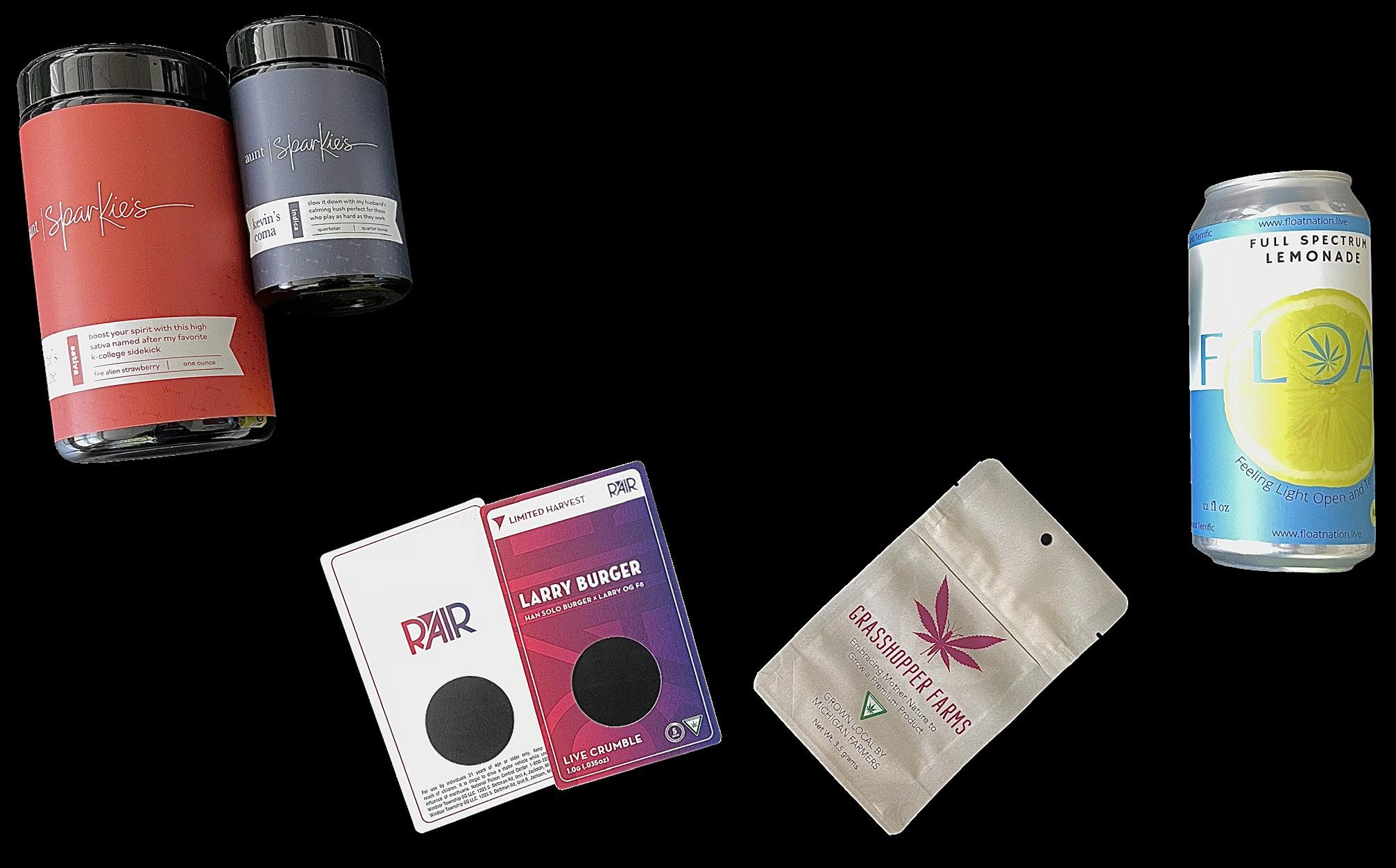
The one-stop shop for your product’s packaging

Ultra-Tech Printing has all the answers in one convenient place.
s the cannabis industry
Akeeps growing and expanding in all directions, it seems that every day presents a new challenge to businesses. The economy is pinching people’s wallets, supply-chain issues seem to be never-ending, and fi nding and retaining employees has never been harder. To succeed, operators need to continually focus on what makes them stand out to their customers. But as everyone knows, that is easier said than done.
Luckily, one of the biggest roadblocks to dropping a new product – the packaging design and fabrication – can easily be solved. Since 1994 Ultra-Tech Printing, based in Grand Rapids, Michigan, has been turning out some of the best packages in the nutraceutical and pharmaceutical markets, giving them the ability to offer their expertise to the emerging cannabis market. Their ultraviolet fl exographic printing allows them to produce affordable, environmentally conscious, high quality packaging. The labels, pouches, and cartons they produce will ensure that your products pop on the shelf.
“UTP has the capability to provide consistency across a brand’s product line due to our ability to produce labels, cartons, and fl exible packaging using the same exact print methods,” says Justin Noordeloos, the general manager of Ultra-Tech Printing. “This also eliminates the need to work with 3-4 different supplies since printers commonly have expertise only in one area. Our customers love the fact we can print the labels for their bottles as well as the cartons they go in. It allows them to plan better, lower costs, and reduce supplier ineffi ciencies.”
As a one-stop shop, they can smoothly usher cannabis companies through the often complicated and confusing process of creating a package for their latest product. And at their size, they can work with brands anywhere in the country with the capacity to accommodate additional business.
It all starts with their in-house graphics department that will guide you on design and color selection to ensure it’s created in a way to meet your packaging goals. From there, the rest of the team will work with you to make sure you understand how the process works and are aware of all the costs upfront with no surprises. UTP would love to add you to their community of customers and help your brand stand out on the shelf!
Ultra-Tech Printing
Great Packaging at a Better Price utprinting.com
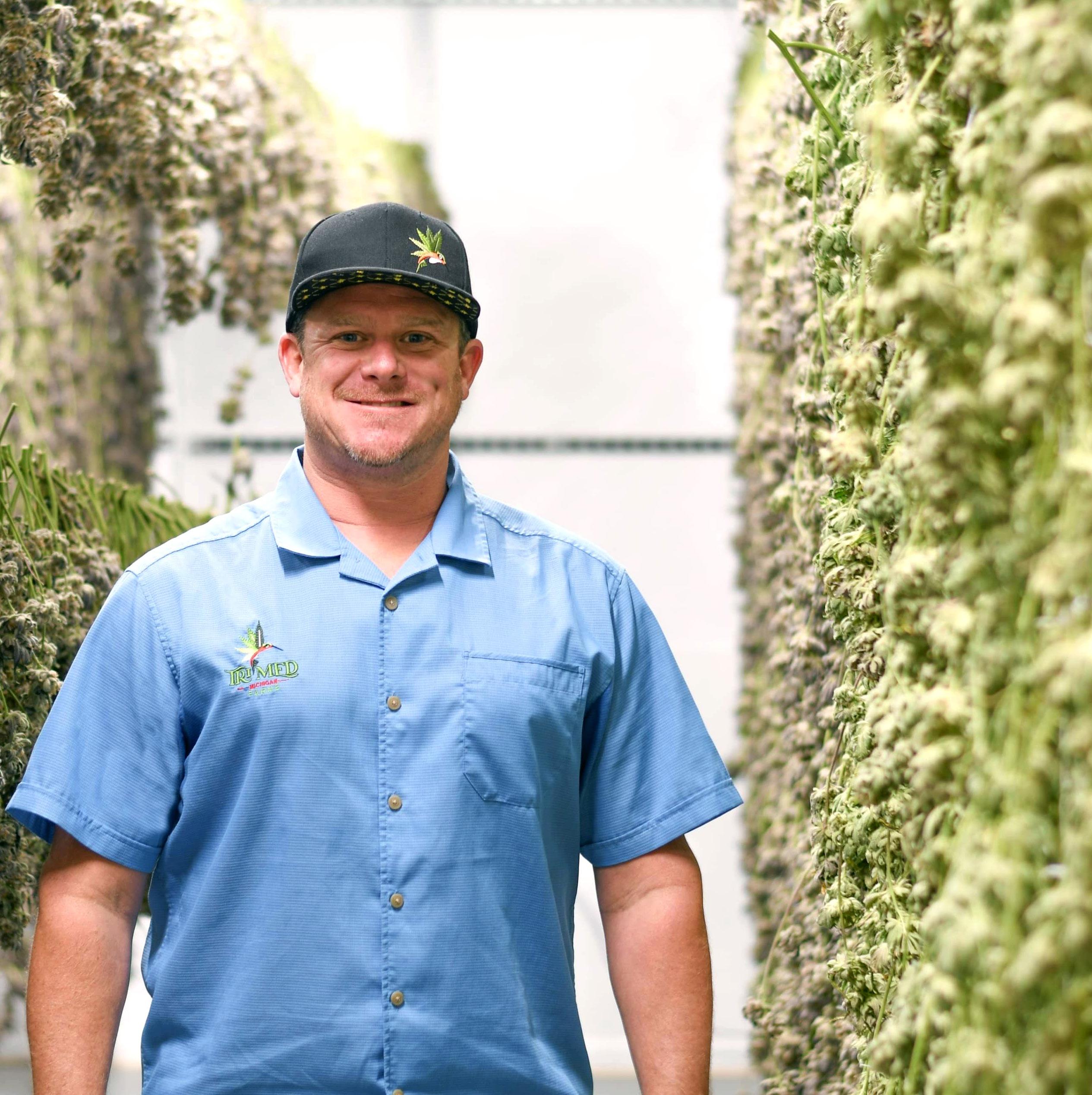
Field of DREAMS
TriMed Farm transforms waste into pure, quality medicine with sustainable agricultural practices.
TEXT ELIZABETH McWILLIAMS
TriMed Farm is a place with modest roots that grew, in very short order, to a company with a remarkably leafy canopy. Located in Chesaning, Michigan, and established in 2017 by co-founders Mike Gelatka, Paige Carioti, co-founder and Market Developer Kevin Gelatka, and along with the vision of Developer and Designer Dave Ghezzi, TriMed started out as a relatively small cannabis growing operation with just six acres of land. In its fi rst year, they produced 4,000 plants. By 2022, TriMed had swelled to thirty-six acres producing upwards of 17,000 plants.
But TriMed didn’t stop at cultivation. Committed to overseeing the process from seed to sale, they have since become a vertically integrated company that includes its own kitchens, brands, and dispensaries. Thus was born The ReLeaf Company—an umbrella organization that now includes the farm itself, two production facilities, and fi ve storefronts.
Although their rapid expansion is remarkable, what truly makes TriMed Farm an inspiration is the manner in which they have remained steadfast to their original vision and prime directive—delivering quality medicine to the patient through sustainable and environmentally benefi cial means.
Mike and Paige care profoundly for the health and well-being of their customers. They also care deeply for the environment and have remained loyal to farming practices that replenish and nourish the land while delivering a pristine and nutrient-packed product. As is now becoming common knowledge, the health of the plant ultimately depends upon the nutrient complexity of its environment.
Mike and Paige understood that symbiotic relationship on a fundamental level and, using the expertise of Chief Cannabis Grower Dave Barnum and Chief Horticulturist Andrew Zalewski, looked for ways to develop a permaculture that supported their vision and the company’s rapid growth. Since one of the more critical components of sustainable farming is the water source, it seemed only natural to start there. And if that water source could also inform the health of the soil and the plant, what better way to deliver this system than through aquaponics?



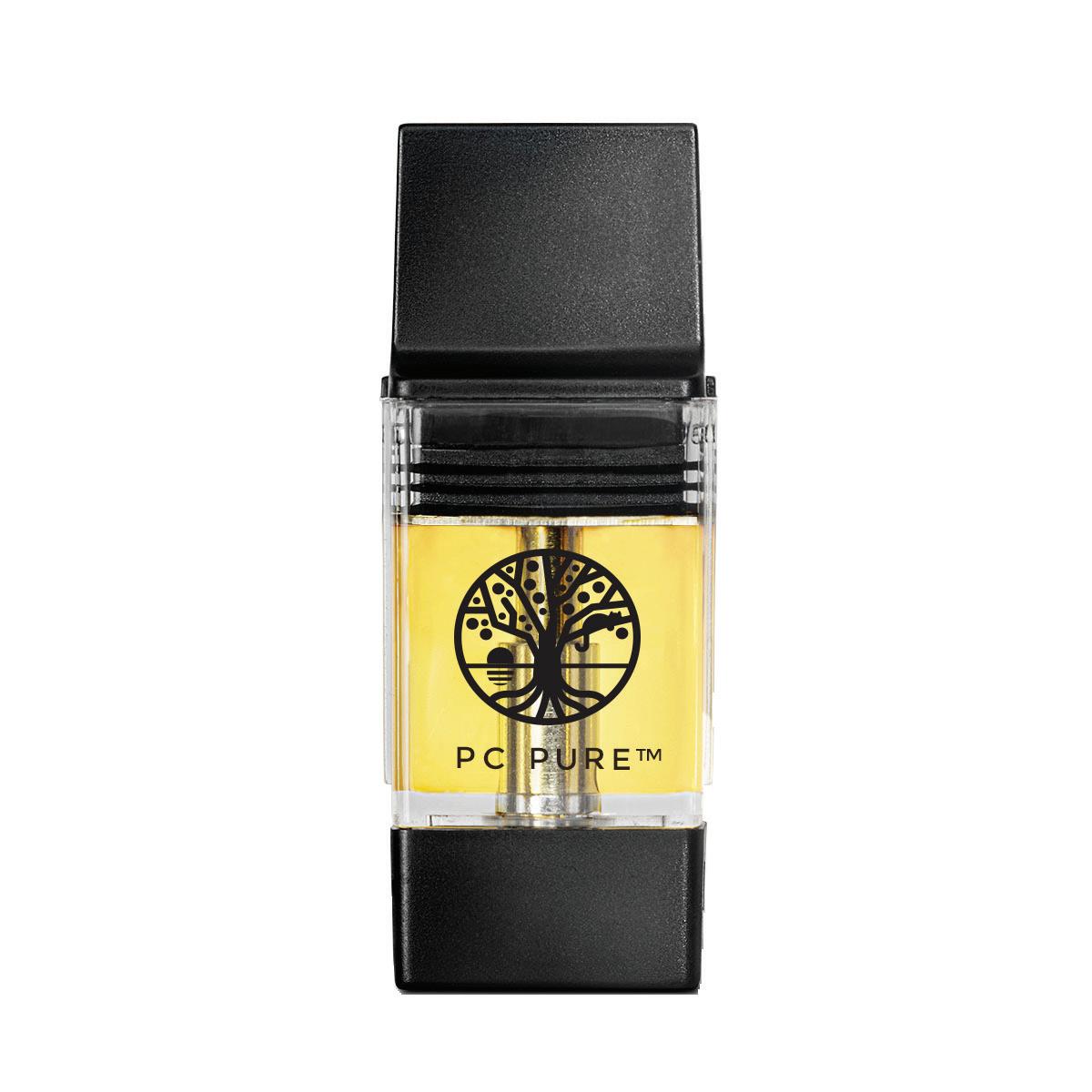
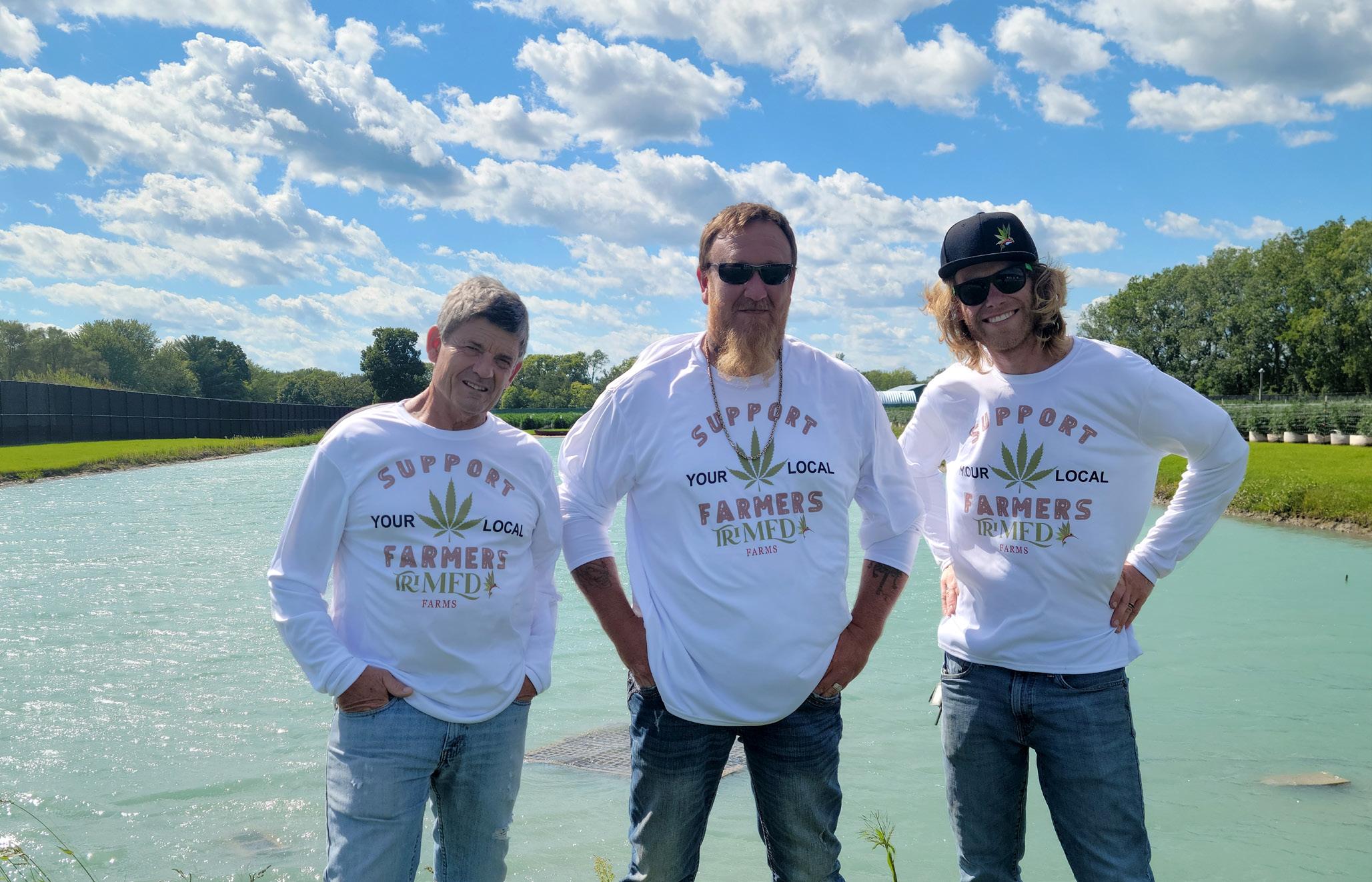
LEARN MORE TriMed and ReLeaf @trimedgrow @releafcentermichigan thereleafcenters.com
Wishing for a Well
In a nutshell, aquaponics is a system that marries aquaculture (fi sh farming) with hydroponics (raising plants with little or no soil). Fish and other aquatic animals and plants produce waste rich in healthy bacteria, ammonia, and nitrates. This nutrient-rich water is applied directly to plants which start their own natural fi ltration process. The end result is clean, fresh water that is redirected back to the primary water source via irrigation channels.
Most city water contains what is deemed tolerable levels of heavy metals and pollutants. To keep these pollutants from their plants, TriMed wanted to source their own water, and aquaponics provided the most effi cient and ethically sound means of doing it.
But herein lay the problem: TriMed didn’t have its own water source. Undaunted, TriMed decided to make their own. Luckily, just a few feet below the surface of the soil was natural groundwater. By channeling that water into a pond of their own, they could ensure their water’s integrity. And so they dug a 1.5-million-gallon pond that they populated with fi sh, frogs, and turtles, all of which now cohabitate with locally sourced aquatic vegetation.
As a result, TriMed has created an optimal environment for delivering nutrient-rich, naturally fertilized water to their crops. Barnum speaks frankly of the farm and the pond. “My favorite thing to say around the farm is ‘keep it simple, stupid.’ People like to overthink it, but it’s simple. The plant will tell you if it’s missing something or if you’re doing something wrong. Whenever you see a tree around a natural water source, it’s thriving. Keep it simple and give the plants the right stuff —the pond’s habitat delivers just that.”
—Dave Barnum, Chief Cannabis Grower, Trimed Farm
What Goes Around Comes Around
The pond is not the only way TriMed has remained true to its vision. Barnum and Zalewski maintain a “quality-in, quality-out” mindset and hold the integrity of the product close to heart in their management of the farm’s operations. “We work with every plant multiple times,” Barnum says, “to ensure the quality of the medicine is to a standard that we are willing to put our name behind.” So in addition to its aquaponic system, TriMed has also partnered with agricultural researcher Andrea McVeigh of MightyMicrobes to naturally enhance soil health. The farm credits MightyMicrobes with boosting plant nutrient cycling uptake and root development.
In another push toward regenerative practices, even the biomass waste is recycled. Plant litter, laden

—Andrew Zalewski, Chief Horticulturist, Trimed Farm
with constituent nutrients, is kept aside so that it can be churned back into the topsoil. This process provides essential nutrients to the soil’s microorganisms, allowing for increased soil fertility and complexity. Experts say conventional industrial agriculture fails to satisfy the permaculture necessary for maintaining soil nutrient levels and pest deterrence, so TriMed has opted for natural pest control methods, such as releasing predators like ladybugs and praying mantises.
TriMed has also started onsite recycling as well as a “reduce and reuse” initiative that limits the number of materials brought onto the property with short shelf-lives or narrow purpose. According to Zalewski, “TriMed strives for perfection in a climate that changes daily. We continue to research and innovate to bring the best products to market.”
This commitment to best practices is evident in the pristine quality and medicinal integrity of each of their products. Director of Compliance Randy Barr oversees the journey from seed to sale by ensuring that each of the 17,500 plants is tagged so that he can track both compliance and movement. Even amid rapid growth, when other businesses are tempted to cut corners in order to maximize profits, TriMed never sacrifi ces quality for quantity. Indeed, churning out a mediocre product in pursuit of a wider profi t margin is a pitfall that TriMed has sidestepped altogether.
Where the Green Grass Grows
Today, fi ve years since their founding, TriMed and the Releaf Company can boast everything from hand-trimmed, cured fl owers with carefully selected strains that carry specifi c cannabinoid and terpene profi les, to just about anything you can fi nd in a dispensary. Such fl exibility allows them to accommodate a wide variety of consumer and medicinal needs. Step into any one of their fi ve dispensaries and an informative staff will guide you through your selections—educating you about their varieties of kief, bulk bud, extracts, cartridges, gummies, chocolates, topicals and pre-rolls.
The realization from seed to sale has resulted in TriMed’s evolution into one of the most notable vertically integrated farms in Michigan. To travel with the seed is really quite a journey—from initial cultivation, to extraction and infusion, to bottling and packaging—a growth that branches up to quite a leafy canopy. The nutritional integrity of the plant, the water, the soil and the environment is vigilantly maintained throughout the entire process.
Such robust growth, born of a vision shared by a handful of people on a mere six square acres, is nothing to shake a stick at. But who’s got sticks, anyway? Those sticks are all too busy sprouting new leaves to be bothered with the likes of us.
ABOUT THE AUTHOR Elizabeth McWilliams is a freelance writer and editor living in Ojai, CA, with her three children. When she’s not haunting local cafés with her books and laptop, you can nd her out on the hiking trails or traveling up the coast. elizabeth-mcwilliams.com



No More Risky Business
Time spent with the National Cannabis Risk Management Association can lead to long-term success.
ote: NCRPS recently
Ncombined with the National Cannabis Risk Management Association (NCRMA) and will serve as the lead risk solutions brand while NCRMA manages association membership and the NCRM Academy’s educational offerings
In today’s increasingly complicated cannabis marketplace, business owners must employ every tool in their toolbox to ensure success. Fresh new products, increased digital engagement, and consumer-friendly retail spaces can grab all the attention and help drive profi ts. Still, there is one critical area that is routinely overlooked.
We are talking about risk management. While it’s not as sexy as many other parts of the industry, it is crucial to ensuring your long-term health and possibly survival. Ensuring that inside any cannabis business’s four walls that their property, product, worker safety, banking, and on-premises risks are secured is no simple task. While many people think that by having insurance, they are safe, they are incorrect.
“Any risk has the potential to make your business worse, period,” says Rocco Petrilli, the CEO and president of the National Cannabis Risk Prevention Services (NCRPS)). “So, if you can mitigate and eliminate that risk, you improve your business. Nobody has ever mitigated risk by buying insurance coverage. Insurance simply shares or transfers the risk that cant be fully reduced. What successful businesses do is take care of any risks up front.”
NCRPS is a pioneering and innovative risk management platform that solely focuses on the complexities of the cannabis world. Their members enjoy access to a whole suite of educational materials and access to cannabis-focused partners, and insurance plans. But one of their most critical offerings is their expert risk management assessment.
By crafting a complete risk assessment from time spent by one of their team, they identify and completely break down everything into easy-to-understand sections. Each facet of your business has a risk score detailing any identifi ed issues and a list of recommendations to solve them. By using tried and true safety standards for non-cannabis industries and the many cannabis-specifi c problems, they know and understand, they can create a detailed action plan to ensure a safe workplace and peace of mind.
They are not fi nished once they hand over their report. That’s when NCRPS can bring their whole host of in-house and service partner resources into play to ensure their clients succeed. This hands-on execution ensures your business safety, security, and success are secured.
National Cannabis Risk Prevention Services
Risk Management ncrps.com —Rocco Petrilli, the CEO and president of the National Cannabis Risk Prevention Services (NCRPS)


